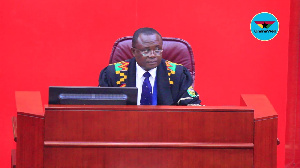 The First Deputy Speaker of Parliament, Joseph Osei Owusu
The First Deputy Speaker of Parliament, Joseph Osei Owusu
The First Deputy Speaker of Parliament, Joseph Osei Owusu has said any emergency measure imposed by the executive must always be subject to parliamentary approval and regular review to prevent the abuse of power by the executive.
Speaking at the 5th World Conference of Speakers of Parliament in Vienna, Austria on Tuesday, 7 August 2021, Mr Owusu said a lot of governments around the world are using Covid-19 as an excuse to abuse their powers without seeking the consent of the legislature in making decisions.
He said: “It is a truism to state that the Covid-19 Pandemic has come to stay, at least, in the foreseeable future. Its impact has been devastating to the global economy just as it has constrained the space for good governance around the world. The quest for the containment of the pandemic has scaled up the use of emergency powers by a number of governments in the world giving rise to the widespread abuse of those powers. The threat to democracy occasioned by this appears to be more catastrophic than the losses that have been experienced by humanity during the pandemic as the world risks losing the dividends of democracy should we fail to act in unison and fast enough.”
He noted that the shrinking space of democracy as a result of the search for solutions to the pandemic has been characterised, in a number of countries, by “the excessive use of emergency powers by the executive arms of government, often reflecting in decisions taken without recourse to the legislature, in some cases, without due consideration to the concerns of opposition parties and in most cases, very repressive in their outlook.”
Such decisions, devoid of public inputs according to Mr Owusu do not often reflect the preferences of the governed neither do they guarantee the public choices making them liable to scaling down the standard of living of the people.
The Bekwai lawmaker stated that “Human rights abuses are inherent in this as basic freedoms are denied the people.”
In his view, the use of draconian measures to impose far reaching restrictions in certain parts of the world, the expansion of the emergency powers of certain governments around the world beyond the reasonable remit of the law and the suppression of media freedom to publish anything other than what is politically correct from the perspective of governments, among others, are examples of undemocratic measures undertaken by certain governments under the guise of fighting the pandemic through the instrumentality of emergency powers.
He said “it is for good reason that the laws of most countries require that emergency measures undertaken by governments are brought to the legislature for ratification and, particularly, for extension beyond the minimal terms that the laws often grant governments to exercise.”
Citing Ghana as an example, Mr Owusu said the imposition of restrictions legislation granted the President of the country to deal with the pandemic limited any emergency regulation enacted to a maximum period of three months in the first instance and to an extended period of only three months when it was absolutely necessary. That way, he said, Parliament retained its control of the regulatory authority of the country.
“Altogether, the legitimacy granted by the Parliamentary approval of the use of emergency powers by governments is complemented by the implicit consent of the public to cooperate with the government in finding a lasting solution to the problem,” he stated, adding that “it is always necessary to subject the use of emergency powers by government to regular legislative scrutiny and reviews.”